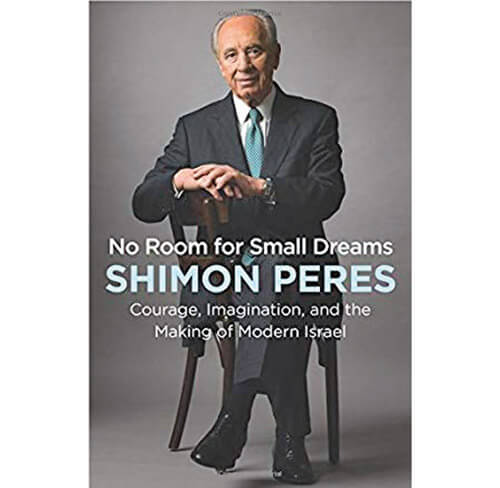











NF – Nonfiction
F – Fiction
The final written work of Israel’s last remaining founding father, Shimon Peres (1923–2016), one of the world’s most beloved statesmen, leaves behind his writing on important events and values that shaped the fledgling State of Israel into the nation it is today. Peres served twice as prime minister and was Israel’s ninth president. The Nobel Peace Prize winner completed “No Room For Small Dreams” in the final weeks of his life. He was a member of 12 cabinets in 66 years of political service to his nation.
Thomas Doherty tells the story of the 1947 hearings into alleged Communist subversion in the movie industry. Show Trial is a character-driven inquiry into how the HUAC hearings ignited the Hollywood blacklist, providing a gripping new history of one of the most influential events of the postwar era. Doherty presents to us this significant political spectacle of the post-war era.
Over a million Jewish immigrants came to the United States between 1882 and 1924. They came to this country with hopes and dreams. And for some, the dream of freedom brought with it problems of the new world that had these “greenhorns” dealing with the psychological impacts of uprooting from their homelands to create new lives in a new place with its new social orders and conditions. The uncertainty of the immigrant would show itself in generations of descendants.
Yeshiva University’s own Rabbi Dr. Stuart W. Halpern, senior adviser to the provost, has given the reader stellar selections of contemporary writers with their own specific outlook on one of Judaism’s beautiful Book of Ruth. The writers, from many diverse academic backgrounds, demonstrate how The Book of Ruth is a story that has a great deal of contemporary relevance. The essayists approach Ruth through themes of friendship, elder care, the struggles to overcome trauma, immigration and also, according to one review, the topics range from “poetry to populism, feminism to family obligations, social work to American history, conversion to contemporary asylum law and religious freedom to the hoped-for messianic redemption.”
Dani Shapiro shares her life-changing experience with the reader. She and her husband do what many of us have done, sending money to Ancestry.com and pretty much expecting validation about our ancestors. But when her report comes back that she is 52 percent Ashkenazic, it raises important and urgent questions that her deceased parents cannot answer. Shapiro had wondered why she did not resemble either of her Orthodox parents.
The results of her investigative journey bring clarity, but knowledge brings along brutal answers and even more questions.
Definitely a page-turner, “A Spy in Exile: A Thriller,” is the kind of fiction you want to read by the pool or the beach. The reader has to put the book down from time to time to take a deep breath because of the read’s intensity. Mossad agent Ya’ara Stein finds herself forced out of her job only to be given a deeply classified assignment by the Israeli prime minister. Stein must put together a secret unit answering only to the PM. The intrigue, the tension makes the reader wonder what might really be going on just below the surface of reality, even if that surface is a pool deck or a sandy beach.
“Lawyers Without Rights: The Fate of Jewish Lawyers in Berlin After 1933” covers how through the use of legislation and degradation Jewish attorneys would lose their abilities to protect the rights of others. The book is, indeed, a wake-up call of just how fragile justice can be, especially in the face of unspeakable injustice.
Author Raphael D. Marcus offers a thorough and complete history of the conflict between Israel and Hezbollah. He gives readers a thorough history of the conflict through his research and interviews. This is the first complete military history of the conflict, now in its fourth decade. Marcus gives us important analysis and information starting with the formation of Hezbollah, Israel’s battle on the ground starting in 1982, its withdrawal in 2000 and the 2006 summer war.
Marcus then ties in the Syrian civil war and its impact on the tensions between Israel and Lebanon.
One review perhaps said it best that Skinazi brings together Orthodoxy and feminism in a complex relationship where Orthodox women continuously question, challenge and negotiate Orthodox feminist values. An eishes chayil, a review tells us, is a woman who “situates religious conviction within her own power.”
Nadia is a part-time nanny and a senior home attendant. But most of all, she is a Ukrainian living in Brooklyn far away from her young daughter. Because of the tension in Eastern Europe, Homeland Security is delaying the travel of her daughter to the U.S. to be with Nadia. And then Nadia learns her child is ill.
So many issues that are relevant right now, including immigration and the power Vladimir Putin has over the lives of average people, come to light in Reyn’s urgent and important work.
Those conversations with the great Elie Wiesel help the writer better understand what his parents experienced. Reich’s parents lived largely in silence about the Holocaust. It wasn’t until after his father passed away and his mother was struggling with debilitating PTSD that he was able to understand their experiences. His friendship with Wiesel helped him with this difficult process of better understanding his family’s untold story.
By Phil Jacobs
�











